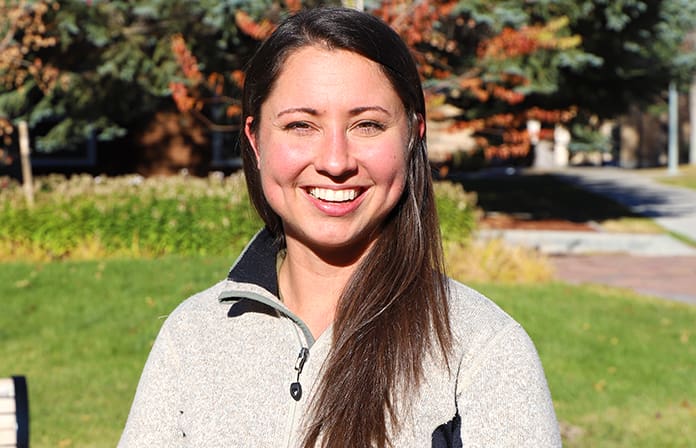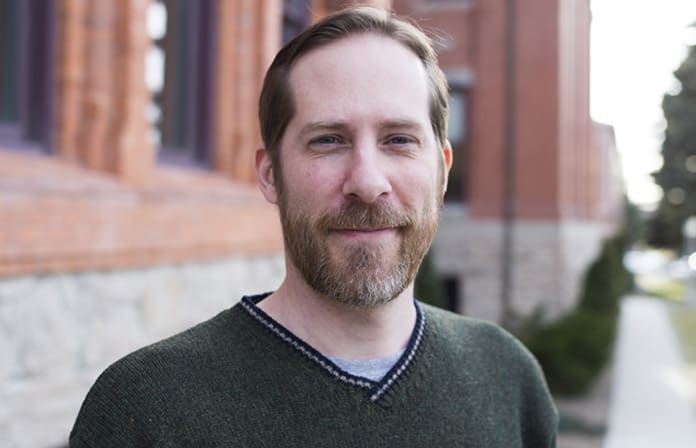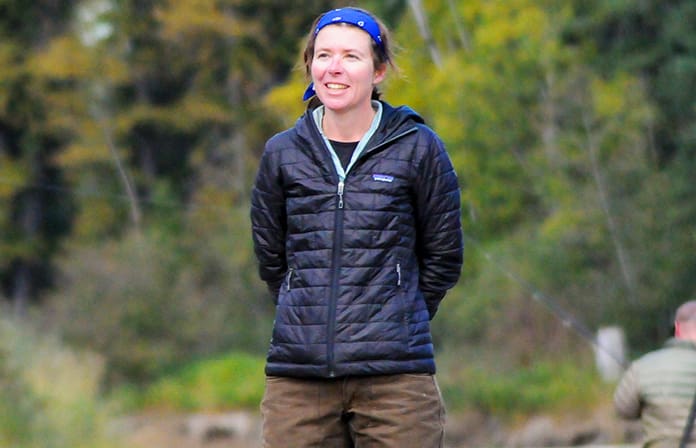Division of Professional Studies
Welcome to Montana Western and the Division of Business and Technology, Equine Studies, and Health and Human Performance! Our division offers Bachelor of Science degrees in the following areas: Business Administration, Kinesiology, Health & Physical Education K-12, and Natural Horsemanship. In addition to bachelor’s degrees, you can earn minors such as teaching, farm & ranch management, coaching, and psychology. To see all minors available in our division, please refer to each of our department’s webpages.
Completing a degree in the Business & Technology, Health & Human Performance, and Equine Studies Division will give you the confidence and skills you need to be prepared for an exciting career in industry or furthering your education in graduate school. The Experience One model features experiential learning, exposing students to the most relevant content and techniques in their industry while being supported by faculty with real-world, professional experience. You will engage in work projects in your field of study, internships, and undergraduate research while being supported by faculty who have professional experience in their disciplines. Block scheduling or focusing on one class at a time allows faculty to utilize field trips, travel to conferences for student presentations, and guest speakers or clinicians to support your learning. Equine students work with their horses on a daily basis! It is our mission to prepare students by providing exemplary hands-on experience.
Please contact any faculty member in the Division of Professional Studies if you have questions about our degree programs. We look forward to guiding you through your college experience while you achieve important life goals!
Purpose Statement:
“Using a variety of experiential practices across our diverse disciplines, the Division of Professional Studies prepares students to be successful in their chosen careers.”
Division Chair: Denise Holland, Ed.D.

Office:
Business & Technology Building 212
Dr. Denise Holland has taught at Montana Western since 2001. Before joining the UMW faculty, Denise taught public high school courses in business and marketing in Idaho and Montana and assisted elementary teachers in creating technology projects.
Her primary teaching interests include business education, technology integration, computer applications and business communications. In her classes, students are working on practical skills needed for today’s workforce such as hard skills (computer skills) and soft skills (communications and team-building).
Her research interests include business education, technology integration
She has published in leading educational journals such as Journal of Educational Computing Research (2014, 2016), ISTE’s Journal of Research on Technology in Education (2016), Journal of Higher Education Theory and Practice (2016), Journal of Leadership Education (2016), and Business Teachers Education Journal (2017). Denise is a member of the National Business Education Association (NBEA).
Division of Education
The Division of Education houses a wide variety of Education programs, including Early Childhood, Elementary, Secondary, K-12, and Special Education programs. Additionally, we support a number of distance partnerships with tribal colleges in the state. Graduates from Education programs at Montana Western go on to have fulfilling careers making a difference in children’s lives all over the state and across the nation. Recent state and national accreditation
Purpose Statement:
“The Division of Education prepares responsive educators, who are innovative scholars and engaged citizens, to teach in an ever-changing world. We aim to serve students from across Montana and beyond through rich, authentic experiences and evidence-based practices grounded in data-driven decision making.”
Division Chair: Katrina S. Kennett, Ph.D.

Office:
Main Hall 222
Dr. Katrina Kennett is deeply interested in how pre-service teachers integrate authentic literacy practices and contemporary technology tools into their instruction. Her research focuses on how teachers plan for student learning and she coaches in-service teachers as they design sustained opportunities for student inquiry in their curriculum. Katrina coordinates – and teaches in – the Rural Fridays program at UMW. She also serves as a university supervisor for student teachers.
Division of Arts, Humanities, and Social Sciences
Welcome to the Division of Arts, Humanities and Social Sciences! Our Division offers a wide range of courses and degree programs. We offer majors in Anthropology and Sociology, English, Glass, Interdisciplinary Social Sciences, Modern History, Psychology, and Visual Arts, as well as Secondary Education dual degrees in English and Secondary Education, Interdisciplinary Social Sciences and Secondary Education, Modern History and Secondary Education. Our Division also works alongside the Division of Education to offer coursework towards degrees in Art Education K-12 and Music Education K-12.
The faculty in the Division of Arts, Humanities, and Social Sciences come from a range of academic backgrounds. They have published books, contributed important scholarship to their fields, and performed and presented their work in professional venues across the country. Most importantly, they are committed teachers who work closely with students to create experiential opportunities for students to engage in scholarly and artistic work. Through coursework in the Division of Arts, Humanities, and Social Sciences, you can produce original research, perform in theatrical and musical productions, create art using an array of mediums, and write creative or scholarly works.
Whether you are fulfilling General Education requirements or working towards a degree in the Humanities, Social Sciences, or Arts, our Division has courses that will help you enhance your critical thinking, develop your communication skills, sharpen your creative abilities, and deepen you understanding of the world.
Purpose Statement:
“The Division of Arts, Humanities, and Social Sciences fosters an environment where students grapple with complex ideas and develop skills in critical analysis, reflection, communication, and creative expression. In doing so, the Division provides our graduates with the liberal arts foundation necessary to examine the human experience and become socially and culturally engaged global citizens.”
Division Chair: Brian Elliott, Ph.D.

Office:
Main Hall 313B
Dr. Brian Elliott earned a B.S. in Computer Science and English from Muskingum University and his M.A. and Ph.D. in English from Ohio University, where his research focused on nineteenth-century American literature and Transatlantic Romanticism.
Starting at UMW in 2017, Elliott currently serves in the Arts, Humanities, and Social Sciences Division at Montana Western as Professor of English and has taught courses in American literature, science fiction and fantasy, graphic novels, experimental narratives, and the Great American Novel. He has also been active in chairing the English Department and General Education Committee. Prior to joining UMW, Elliott was Assistant Professor of English at Urbana University in Ohio, where he also served as Chair of Humanities and Director of the William G. Edwards Honors Program.
Elliott’s recent publications include two peer-reviewed articles on Herman Melville: “‘I could not bear to look’: The Just-World Hypothesis in Melville’s ‘The Piazza’” in the interdisciplinary journal Soundings and “Starbuck’s Train and Melville’s Trolley: ‘The Musket’ as Thought Problem in Moby-Dick” in the College English Association’s CEA Critic. Additionally, Elliott has most recently presented work on acts of reciprocity and revenge in Catharine Maria Sedgwick’s Hope Leslie at the American Literature Association symposium on the historical imagination, and he is in the early stages of a new research project exploring the role of lying and deceit in early American fiction.
Division of Mathematics and Natural Sciences
Welcome to the Division of Mathematics and Sciences at the University of Montana Western! Our Division offers undergraduate students many degree options and focus areas to provide the tools and experience for careers and graduate programs in a diverse set of fields. Our Division includes the departments of Mathematics, Environmental Science and Biology and we offer Bachelor of Science degrees in Mathematics, Environmental Science, Environmental Sustainability, Biology and Ecology in addition to secondary education in all three fields.
The exceptional faculty in our Division use their professional expertise to create unique educational experiences for our students by capitalizing on Experience One and the block schedule. We prepare our students for careers and post-graduate study by effectively utilizing
Our Division is excited to help guide you through your educational experiences with the hope of nurturing life-long learning and a strong understanding of the natural world. We will provide you with the tools and experiences to excel in your post-graduate careers and we take extreme pride in helping our students be successful! Please explore the information provided in our departmental websites and feel free to reach out to any of the professors within our Division to answer any specific questions that you may have. We look forward to exploring our world together with you!
Purpose Statement:
“Through authentic practice in the discipline and cutting-edge methodologies, we develop highly competitive graduates in the Division of Mathematics and Natural Sciences. Our programs prepare future professionals capable of collecting and analyzing data, forming hypotheses, and communicating results to a society trying to adjust to a rapidly changing world.”
Divison Chair: Michelle Anderson, Ph.D.

Office:
Block Hall 321
Dr. Anderson’s research engages undergraduates in discovering how organisms, communities, and ecosystems respond to natural and anthropogenic change, often in aquatic systems. Recent research topics include freshwater mussel ecology and flood-irrigation landscapes for migratory birds. She also works in undergraduate education innovation, citizen science initiatives, and environmental career development. She completed her Ph.D. in Organismal Biology and Ecology at the University of Montana – Missoula in 2008.
The University of Montana Western’s (UMW) mission of experiential education coupled with a block schedule allows Dr. Anderson to engage students in authentic research activities and contribute to national efforts to improve undergraduate science education. Her courses center on an undergraduate research and service model of students collaborating with natural resource professionals from government agencies, non-profits, and colleges.
In 2008-2009 she participated in “Vision and Change in Undergraduate Biology Education” workshops sponsored by the National Science Foundation (NSF) and the American Association for the Advancement of Science, aimed at stimulating nationwide education reform via student-centered active learning and research. Since 2011 her work has included Ecological Research as Education Network (EREN) projects involving hundreds of faculty and students across the continent. A 2015 Summer Faculty Fellowship with the US Fish and Wildlife Service allowed her to learn from Service biologists while completing a campus conservation awareness project. Between 2016 – 2020 she has participated in numerous national science and math education networks, including several Quantitative Biology & Education Synthesis (QUBES) Faculty Mentoring Networks, a BIOME Institute, and the Research Coordination Network Incubator Next Generation Careers – Innovation in Environmental Biology.